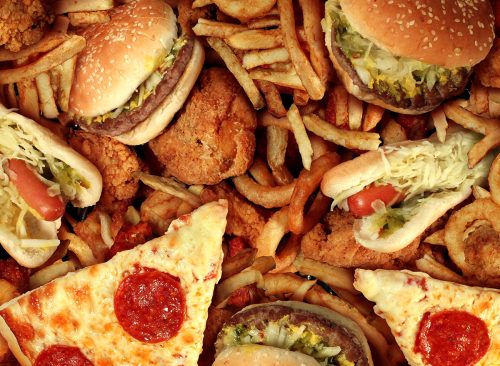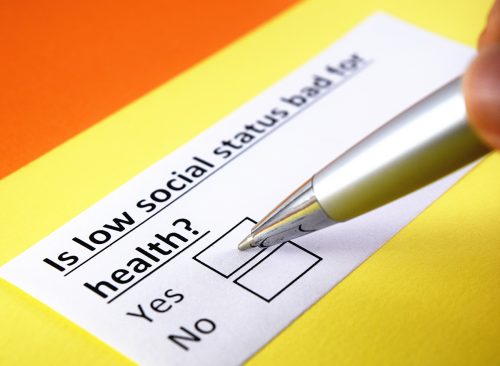
According to the CDC, 41.9% of US adults are living with obesity. “Obesity is a complex disease involving having too much body fat. Obesity isn’t just a cosmetic concern,” says the Mayo Clinic. “It’s a medical problem that increases the risk of many other diseases and health problems. These can include heart disease, diabetes, high blood pressure, high cholesterol, liver disease, sleep apnea and certain cancers.” Knowing what leads to obesity is one step in preventing or reversing it—here are 10 scientifically proven causes of obesity.
1
Depression and Emotional Eating

Depression and stress are linked to obesity, experts say. “Physiological factors such as depression or low self-esteem, as well as social factors such as discrimination or social stigmatization, often lead to binge eating and negative emotional eating, which can contribute to obesity,” Jovan Rozar, PhD, MPH, tells Grand Canyon University.
2
Poor Sleep

Research shows poor sleep is linked to excess weight and obesity. “Sleep and obesity are intertwined in a vicious cycle,” Safia Khan, MD, tells UT Southwestern Medical Center. “Obesity can cause sleep disturbances, and sleep disturbances can influence weight gain through the release of stress hormones.”
3
Drinking Calories

Sugary drinks have become the norm, making it easy to consume hundreds of extra calories in minutes. “People can drink many calories without feeling full, especially calories from alcohol,” says the Mayo Clinic. “Other high-calorie beverages, such as sugared soft drinks, can contribute to weight gain.”
4
Genetic Factors

Genetics have a part to play in obesity. “Studies show that the likelihood of becoming obese is passed down through a family’s genes,” says Johns Hopkins Medicine. “Researchers have found several genes that appear to be linked with obesity. Genes, for instance, may affect where you store extra fat in your body.”
5
Junk Food

Ultra-processed junk foods are notoriously bad for your health and your weight. “Food industry marketing in mass media often aggressively promotes unhealthy foods which, along with the tendency of restaurants to serve large portions, encourages high calorie consumption,” Dr. Rozar says.
6
Socioeconomic Factors

Socioeconomic factors can impact your weight. “How much money you make may affect whether you are obese,” says Johns Hopkins Medicine. “This is especially true for women. Women who are poor and of lower social status are more likely to be obese than women of higher socioeconomic status. This is especially true among minority groups.”
7
Too Much Sugar

A diet high in added sugars may lead to obesity. “I don’t think we have enough evidence yet to suggest that sugar is the reason for the obesity epidemic,” cardiologist Chiadi E. Ndumele, MD, MHS, tells Johns Hopkins Health. “But there is enough evidence to say that elevated sugar consumption is an important contributor to weight gain.”
8
Sedentary Lifestyle

Our increasingly sedentary lifestyles is one factor contributing to the obesity crisis. “Many people who live in Western countries now have jobs that are much less physically demanding, so they don’t tend to burn as many calories at work,” says the Mayo Clinic. “Even daily activities use fewer calories, courtesy of conveniences such as remote controls, escalators, online shopping, and drive-through restaurants and banks.”
9
Metabolism Issues

Metabolism issues could lead to weight gain and obesity. “Metabolism and hormones differ from person to person, and these factors play a role in how much weight you gain,” says Johns Hopkins Medicine. “One example is ghrelin, the “hunger hormone” that regulates appetite. Researchers have found that ghrelin may help trigger hunger. Another hormone called leptin can decrease appetite. Another example is polycystic ovary syndrome (PCOS), a condition in women caused by high levels of certain hormones. A woman with PCOS is more likely to be obese.”
10
The Main Cause of Obesity

Obesity and weight gain are caused by taking in more calories than are being burned off. “Although there are genetic, behavioral, metabolic and hormonal influences on body weight, obesity occurs when you take in more calories than you burn through typical daily activities and exercise,” says the Mayo Clinic. “Your body stores these excess calories as fat.”














